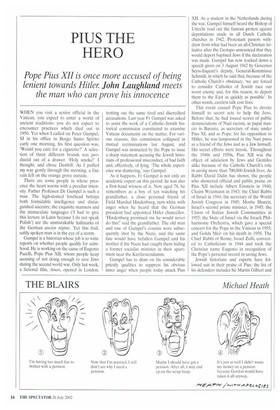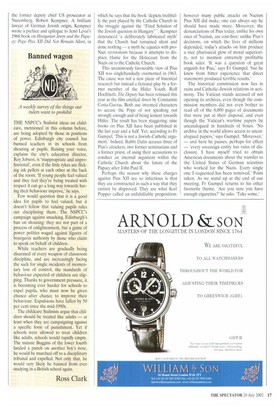PIUS THE HERO
Pope Pius XII is once more accused of being
lenient towards Hitler John Laughland meets
the man who can prove his innocence
WHEN you visit a senior official in the Vatican, you expect to enter a world of ancient traditions: you do not expect to encounter practices which died out in 1950. Yet when I called on Peter Gumpel, SJ in his office in Borgo Santo Spirit() early one morning, his first question was, 'Would you care for a cigarette?' A selection of three different brands was produced out of a drawer. 'Holy smoke!' I thought, and chose Dunhill. As I puffed my way gently through the morning, a fine rain fell on the orange grove outside.
There are some people in whose presence the heart warms with a peculiar intensity. Father Professor Dr Gumpel is such a man. The high-domed forehead betrays both formidable intelligence and distinguished ancestry; the exquisite manners and the immaculate languages CI had to give this lecture in Latin because I do not speak Polish') are the unmistakable hallmarks of the German ancien regime. Yet this frail, softly spoken man is in the eye of a storm.
Gumpel is a historian whose job is to write reports on whether people qualify for sainthood, He is working on the cause of Eugenio Pacelli, Pope Pius XII, whom people keep accusing of not doing enough to save Jews during the second world war. Only last week, a fictional film, Amen, opened in London,
trotting out the same tired and discredited accusations. Last year Fr Gumpel was asked to assist the work of a Catholic—Jewish historical commission constituted to examine Vatican documents on the matter. For various reasons, this commission collapsed in mutual recriminations last August, and Gumpel was instructed by the Pope to issue a sharp statement accusing the Jewish historians of professional misconduct, of bad faith and, effectively, of lying. 'The whole experience was shattering,' says Gumpel.
As it happens, Fr Gumpel is not only an academic expert on this period: he was also a first-hand witness of it. Now aged 78, he remembers as a boy of ten watching his grandfather, a close personal friend of Field Marshal Hindenburg, turn white with anger when he heard that the German president had appointed Hitler chancellor. 'Hindenburg promised me he would never do this!' said the grandfather. The old man and one of Gumpel's cousins were subsequently shot by the Nazis, and the same fate would have befallen Gumpel and his mother if the Nazis had caught them hiding a former socialist minister in their apartment near the Kurfurstendamm.
Gumpel has to draw on his considerable priestly qualities to suppress his obvious inner anger when people today attack Pius XII. As a student in the Netherlands during the war, Gumpel himself heard the Bishop of Utrecht read out the famous protest against deportations made in all Dutch Catholic churches in 1942. Protestant pastors withdrew from what had been an all-Christian initiative after the Gestapo announced that they would deport baptised Jews if the declaration was made. Gumpel has now tracked down a speech given on 3 August 1942 by Governor Seyss-Inquart's deputy, General-Kommissar Schmidt, in which he said that, because of the Catholic Church's obstinacy, 'we are forced to consider Catholics of Jewish race our worst enemy and, for this reason, to deport them to the East as quickly as possible'. In other words, careless talk cost lives.
This event caused Pope Pius to devote himself to secret acts to help the Jews. Before that, he had issued scores of public denunciations of Nazi racism, as papal nuncio in Bavaria, as secretary of state under Pius XI, and as Pope: for his opposition to Hitler, he was lampooned in the Nazi press as a friend of the Jews and as a Jew himself. His secret efforts were heroic. Throughout the 1940s and 1950s, Pius XII was the object of adulation by Jews and Gentiles alike because of the Catholic Church's role in saving more than 700,000 Jewish lives. As Rabbi David Dalin has shown, the people who showered official and public praise on Pius XII include Albert Einstein in 1940; Chaim Weizmann in 1943; the Chief Rabbi of Israel in 1944; the secretary of the World Jewish Congress in 1945; Moshe Sharett, Israel's second prime minister, in 1945; the Union of Italian Jewish Communities in 1955; the State of Israel via the Israeli Philharmonic Orchestra, which gave a special concert for the Pope in the Vatican in 1955; and Golda Meir on his death in 1958. The Chief Rabbi of Rome, Israel Zolli, converted to Catholicism in 1944 and took the Christian name Eugenio in recognition of the Pope's personal record in saving Jews.
Jewish historians and experts have followed suit in their praise of Pius: the list of his defenders includes Sir Martin Gilbert and
the former deputy chief US prosecutor at Nuremberg, Robert Kempner. A brilliant lawyer of German Jewish origin, Kempner wrote a preface and epilogue to Jeno Levai's 1968 book on Hungarian Jewry, and the Papacy: Pope Pius XII Did Not Remain Silent, in
which he says that the book 'depicts truthfully the part played by the Catholic Church in the struggle against the "Final Solution of the Jewish question in Hungary" . Kempner denounced 'a deliberately fabricated myth' that the Church had remained silent and done nothing — a myth he equates with proNazi revisionism because it attempts to displace blame for the Holocaust from the Nazis on to the Catholic Church.
This unanimously favourable view of Pius XII was singlehandedly overturned in 1963. The cause was not a new piece of historical research but instead a fictional play by a former member of the Hitler Youth, Rolf Hochhuth. The Deputy has been reissued this year as the film entitled Amen by Constantin Costa-Gavras. Both use invented characters to accuse the Pope of not speaking out strongly enough and of being lenient towards Hitler. The result has been staggering: nine books on Pius XII have been published in the last year and a half. Yet, according to Fr Gumpel, This is not a Jewish-Catholic argument.' Indeed, Rabbi Dalin accuses three of Pius's attackers, two former seminarians and a former priest, of using their accusations to conduct an internal argument within the Catholic Church about the future of the Papacy after John Paul II.
Perhaps the reason why these charges against Pius XII are so infectious is that they are constructed in such a way that they cannot be disproved. They are what Karl Popper called an unfalsifiable proposition: however many public attacks on Nazism Pius XII did make, one can always say he should have made more. Moreover, the denunciations of Pius today, unlike his own ones of Nazism, are cost-free: unlike Pius's decisions, on which the lives of millions depended, today's attacks on him produce a nice pharisaical glow of moral superiority, not to mention extremely profitable book sales. 'It was a question of great anguish for Pius,' says Fr Gumpel. 'but he knew from bitter experience that direct statements produced terrible results.'
The historical commission now lies in ruins and Catholic-Jewish relations in acrimony. The Vatican stands accused of not opening its archives, even though the commission members did not even bother to read all of the 8,000 pages of documents that were put at their disposal, and even though the Vatican's wartime papers lie uncatalogued in hundreds of boxes. 'No archive in the world allows access to uncatalogued papers,' says Gumpel. 'Moreover,' — and here he pauses, perhaps for effect — 'every sovereign entity has rules of disclosure. I have myself tried to obtain American documents about the transfer to the United States of German scientists who worked for the Nazis. Every single one I requested has been removed.' Point taken. As we stand up at the end of our meeting, Fr Gumpel returns to his other favourite theme, 'Are you sure you have enough cigarettes?' he asks. 'Take some.'



























































 Previous page
Previous page